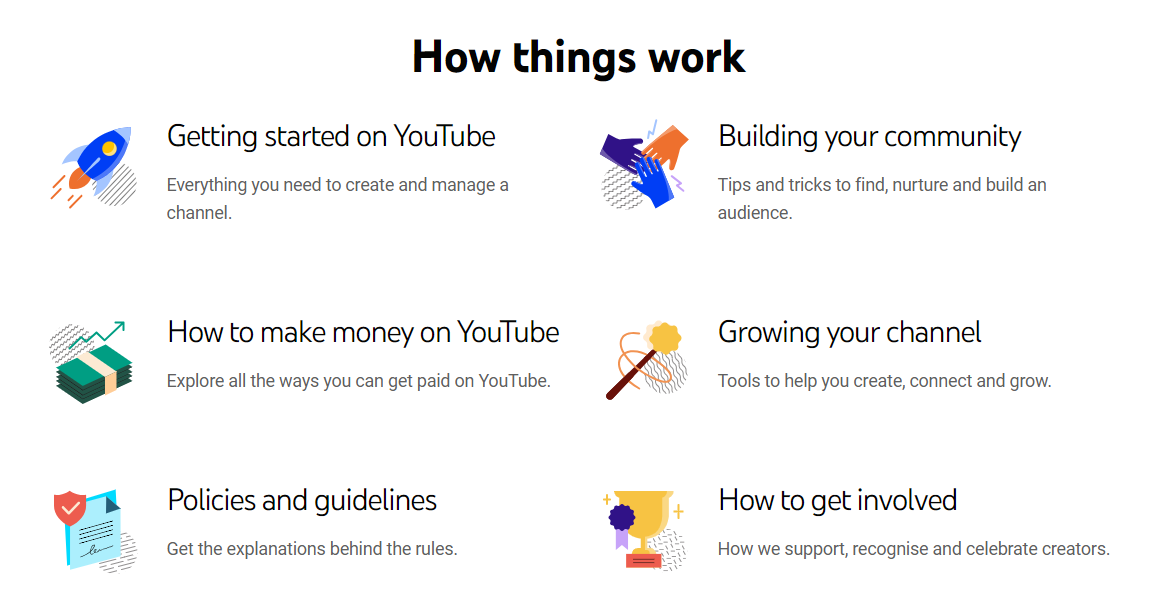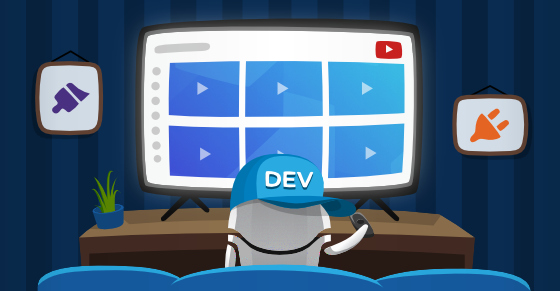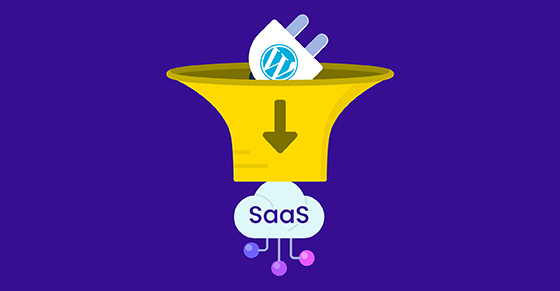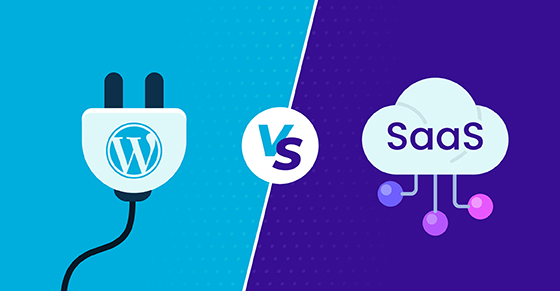|
|
Lights, camera, software 🎥 WordPress and SaaS are competitive (and often saturated) markets, and owning your space and growing your audience as an entrepreneur can be tough. A possible solution? Using YouTube marketing to establish authority and secure your space in the spotlight.
While this article focuses on WordPress and SaaS entrepreneurs, anyone with a digital stake stands to benefit from YouTube marketing, including:
- Aspiring (or wannabe 😉) influencers and content creators
- Entrepreneurs and SMBs
- Marketers
- Freelancers
- Online sellers
- Anyone trying to grow their online presence via brand-building
In this article, I’ll share how to get started on your YouTube marketing journey, how to work out a kick-ass video creation plan, and how to optimize your channel and engage your audience for growth and exposure.
Okay then: Let’s get rolling 🎞️

Marketing on YouTube: Understanding the Platform
Let’s address the fundamental question: Why should you care about YouTube marketing?
Simply put, YouTube has a MASSIVE reach. Here are a few stats from Demand Sage:
- There are 2.7 billion active users on the platform. That’s nearly a third of the global population 🤯
- More than half of internet users access YouTube at least once every month.
- The platform has 122 million daily users.
Okay, but stats aside… why is YouTube marketing a promising avenue for software product makers in particular? After all, it’s unlikely a WordPress or SaaS entrepreneur will become the next MrBeast or PewDiePie.
The answer: YouTube marketing offers a way for you to engage with your audience on a more personal level, which is invaluable in the digital era.
In days gone by, shoppers would purchase directly from their local butcher, baker, and candlestick maker. While eCommerce has disrupted business by eliminating borders, it’s done away with the ability to form face-to-face connections with customers.
Humans are hardwired to trust other humans (I read this in a Malcolm Gladwell book so it’s definitely true, okay). Unless customers are buying from a known brand like Amazon, purchasing something online from someone they don’t know will always feel a tad risky. Here’s where the magic of YouTube marketing kicks in: seeing a friendly face on a video will authenticate the offering, potentially leading to more sales and — in time — increased exposure.
Philosophical justifications aside, webdew offers a few practical reasons to consider video marketing, which is also applicable to YouTube marketing:
- It could improve your website’s SEO.
- YouTube videos drive up conversion rates.
- YouTube marketing’s visual nature increases brand recognition.
- YouTube videos are more shareable across other platforms than any other type of content.
- Viewing YouTube videos is popular on all digital devices.
- Improvements in videography on smartphones and other devices mean you don’t need to fork out a fortune for a studio setup. You can start with the basics and add upgrades as your YouTube marketing endeavors progress.
Assuming you’re convinced 💃🕺 How do you get your YouTube marketing show on the road?
When Should You Consider Creating a YouTube Channel?
Logic would dictate that having an existing product is the bare minimum before considering YouTube marketing. However, Vova Feldman — founder and CEO of Freemius and a serial entrepreneur with experience using YouTube to grow new businesses — believes it’s the exact opposite:
I think the answer should be as soon as possible. Why? Because if you can build an audience before you have a product, you can market the product to that audience from the get-go. Also, you can share your journey of building the product or create videos that are relevant to the target audience of whatever product you’re planning to build.
Ultimately, there’s no right or wrong answer and you shouldn’t let your experience limit you from harnessing YouTube marketing. The important thing is that you need to offer content that’s of value to your target audience — be it your journey of building a software product or tips and tutorials on working with software tools or programs.
How Can You Learn About YouTubing?
Vova believes that jumping in and getting your hands dirty is the best way:
There’s lots of free information and courses out there. Spend some time (and money, if need be) to learn the basics and ensure you feel comfortable putting something out there. However, there’s no better learning experience than actually getting to work creating content, experimenting, and learning from your mistakes and successes.
A shining example of this is Jamie Marsland’s YouTube journey. He’s the founder of Pootlepress and a YouTube star who managed to grow his channel to 14k+ subscribers in less than three years by uploading weekly WordPress tutorial videos. Jamie was also a guest on the final episode of the first season of Freemius’s podcast plugin.fm. His decision to take a stab at YouTube marketing was by no means strategic or calculated:
However, he does admit that successful YouTube marketing is no mean feat. In fact, it’s a constant process of trial and error: “There’s a huge amount of learning that goes into becoming semi-good or good at YouTube. And if I go back and look at my videos from a year-and-a-half ago, I think they’re absolutely dreadful. So you definitely go on a journey of getting better at YouTube videos, in terms of how you pace them and stuff like that. And you also get better and more natural in front of the camera, which is a big thing.”
As a starting point for your YouTube marketing efforts, I highly recommend subscribing to the YouTube Creators channel. It offers tons of useful information for new and existing YouTubers on topics like:
- New and trending practices
- YouTube shorts
- Live streaming

Okay. I’ll assume you’re committed to putting in the graft and rolling with the punches 🥊 The next question is, how can you plot your grand YouTube marketing plan?
YouTube Marketing: Setting Clear Objectives
The first thing you should do is identify your niche and target audience. We’ve already touched on this, but to further illustrate:
- If your aim is to document your product/business-building journey, your niche target audience is new and aspiring product builders and entrepreneurs.
- If your content is about using software tools or programs, your target audience is likely nestled in the tech or content creation space. While Jamie’s YouTube channel is branded as offering tips and tricks on WordPress, most of his success has stemmed from focusing on how to use Gutenberg and WooCommerce.
Once you’ve got a plan in place, you need to align your YouTube objectives with your business objectives. In other words, how will YouTube marketing benefit your undertaking? Will it mainly increase exposure for your business, or can your product or service solve a problem for your target audience?
On that note, a word of caution: Don’t over-promote your own product or service. Vova explains:
It’s all about finding the balance between providing value to your viewers first and then identifying ways to promote your product or service.
Once you’ve figured out how YouTube marketing will benefit your business, set yourself a few goals. It could be as simple as committing to making a set number of videos over the next twelve months or growing your YouTube followers to X amount.
Next up: let’s get those creative juices flowing.
Start Making YouTube Videos 🎬
Figuring Out the Format
Before channeling your inner Christopher Nolan, decide on the right format for your YouTube marketing videos.
- Incorporating a combination of vlogs and demo videos is likely your best bet for documenting your product/business-building journey.
- However, if demonstrating how to use software tools and programs is the plan, focus on creating carefully edited and compiled tutorials.
Once the medium has been chosen, you can start innovating.
Generating Ideas
Your process will be unique, and there’s every chance you already have a few topics you’d like to unpack. Don’t be surprised about when or where inspiration strikes — Jamie admits that he gets the majority of his ideas while showering 🚿🤣
He uses a spreadsheet to document them and believes that training your creative muscles is possible. But even so, ideas can be hard to come by, which makes one wonder if conjuring them gets harder down the line. This is what Jamie has to say:
Creating a Content Strategy
Next up is figuring out how to plan and schedule your videos. You’ll want to do this based on your audience’s geodemographics: the day(s) and time(s) they’re most active on YouTube.
Luckily, you don’t need a bank of videos and a sizeable fanbase to access audience insights. A good SEO tool can help you research your target audience to plan an effective content strategy. Simply enter keywords that are applicable to your content and use the results to guide you. I recommend the following:
- TubeBuddy, a desktop extension that integrates with YouTube and uses AI tools to help you grow your audience
- vidIQ, which has a number of features to help you grow your channel, such as title, content, and keyword generators, as well as auditing tools
Okay — you’ve got some killer ideas in the tank and you’re ready to shoot them (not literally, of course 🫣). The next order of YouTube marketing business is making a channel that turns heads.
Optimizing Your YouTube Channel
The key to successful YouTube marketing is setting up a professional-looking channel that appeals to your audience. If you’ve convinced a viewer to click through to one of your videos, you need to retain them as long as possible by enticing them to explore your channel and view more. To do this, the experience must be as seamless as possible.
Before we get into the navigational side of things, let’s discuss brand and visual appeal. The first step(s) in optimizing your channel for YouTube marketing is creating an engaging channel name and logo.
Channel Name
Conceiving a channel name is simple enough. Your company name will do just fine, but a ‘personal’ channel is likely to create even more trust (ergo traction) amongst your audience. Case in point: Jamie’s YouTube channel is self-titled.
Logo
When it comes to your logo, you can’t afford to cut corners (that’s a pun if you ask me 😌). A contemporary logo is key for establishing credibility, which breeds trust. However, it’s likely that most entrepreneurs won’t be creating their own logos, but will instead opt for outsourcing to a designer. But what should you be looking for when reviewing the options presented to you?
“A modern approach to creating logos is using a minimalistic style (involving the symbol and text) with a simple yet striking color palette,” says Vitalii Romaniuk, Freemius’s Lead Designer. “Less really is more.”
If you’re going with a self-titled/personal YouTube channel, you can opt for a cool profile pic instead.
Once your YouTube channel’s name and look are locked in, you need to communicate what you’re all about.
A Compelling Channel Description and ‘About’ Section
It’s perfectly fine — beneficial, even — to pay a professional copywriter to take care of this for you (here’s looking at you, ChatGPT ☠️). However, bear in mind that it’s your channel and should speak to your audience, especially if your content is targeting a specific niche. Don’t be afraid to weave in some industry-specific jargon, either.
A little aside: It took me months to realize that Vova, Swas (Freemius’s VP of Engineering), and Dror (our CTO) weren’t referring to press releases or public relations when discussing PRs — they were actually talking about pull requests 🙈 My point is, including the lingo validates that you’re the real deal to those in the know.
Subscribe and grab a free copy to start Mastering SEO on the WordPress.org Repository
Make the WordPress.org search algorithm work for you with actionable tips to rank your plugin higher.

Setting Up a User-Friendly Channel Layout
YouTube’s UX makes it easy for YouTubers — or YouTube Creators — to set up a channel that’ll help their YouTube marketing efforts take off. I recommend consulting the following two articles while putting a channel together:
- This guide by YouTube explains everything you need to know to get started — from what to do before your first post to getting your channel off the ground and optimizing it for YouTube marketing.
- Buffer’s guide on creating a YouTube channel in 2023 lays out channel art specifics and provides handy pointers for optimizing your YouTube channel.
Keep Your Channel On-Brand
Maintaining continuity and uniformity on your channel is key to successful YouTube marketing. With perseverance, you’ll have a whole bank of valuable content to offer new and existing audience members. “Stick to your branding, keep your videos consistent, and make accents with your colors,” Vitalii advises.
Once your channel is up and running, you need to captivate your crowd.
Building and Engaging with Your Audience
A great way to generate ideas and make content that provides real value to your audience is by being active on social media platforms — particularly, Twitter. According to Jamie:
I use Twitter to test some of my content ideas. So I’ll put a tweet out, and I’ll turn the tweets that get a lot of engagement into YouTube videos.
You should also figure out how to use other platforms for YouTube marketing purposes. At Freemius, we make a point of converting carefully selected YouTube snippets for our social media platforms as well as including video snippets in our blogs (like I’ve done in the one you’re reading right now).
Following some simple etiquette will win favor among your followers and is essential for effective YouTube marketing:
- Encourage viewer interaction in your videos by asking them to like, share, or comment on a question.
- Likewise, make sure you diligently respond to comments and feedback. A simple Thanks! or Glad you enjoyed the video! won’t cut it — put in some time and effort to come up with meaningful responses.

YouTube for Business: Measuring Success and Analytics
YouTube Studio is your friend when it comes to useful statistics and cool features. It’s where you’ll manage your channel and your videos and offers access to a dashboard, content insights, and analytics. It also allows you to access comment moderation, subtitles, monetization settings (provided that you’re part of the YouTube Partner Program), customization, and an audio library.
Ultimately, the benchmarks of successful YouTube Marketing boil down to audience growth and/or sales increases. Case in point, Jamie’s YouTube marketing efforts have yielded revenue:
The last thing you’re likely wondering about is whether adding a YouTube channel to your plate is plausible while growing a business — especially as an entrepreneur.
Is Juggling Your Business and Your YouTube Channel Possible?
Contrary to what you might imagine, Jamie’s never had to sacrifice for Pootlepress or manage a balancing act while growing his YouTube channel. “It actually works really well,” he says. “You can shoot videos any time of day, including on weekends. You have a lot of flexibility when you start creating this stuff.”
Granted: getting started with YouTube marketing is going to demand some effort on your part. It’s also not a quick win for growing your business or audience and will require constant improvement and upkeep. But if you can offer something of value and present it in a digestible format, the long-term benefits can be truly impactful.
I look forward to seeing your YouTube channel coming to fruition.









